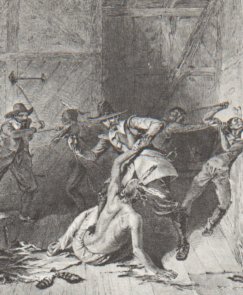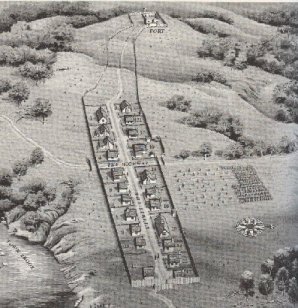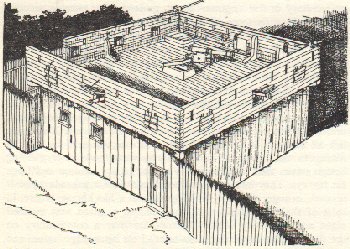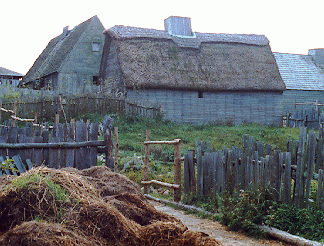 starting
in June of 1623. They lived barely day to day from fishing. The burning sun of July
scorched the earth. No rain fell for weeks. The cornstalks and bean vines began to wilt
and turn brown and dry.
starting
in June of 1623. They lived barely day to day from fishing. The burning sun of July
scorched the earth. No rain fell for weeks. The cornstalks and bean vines began to wilt
and turn brown and dry. Power of prayer
There was a drought of 7 weeks  starting
in June of 1623. They lived barely day to day from fishing. The burning sun of July
scorched the earth. No rain fell for weeks. The cornstalks and bean vines began to wilt
and turn brown and dry.
starting
in June of 1623. They lived barely day to day from fishing. The burning sun of July
scorched the earth. No rain fell for weeks. The cornstalks and bean vines began to wilt
and turn brown and dry.
Governor Bradford and Elder Brewster called for "a solemn day of humiliation." The bedraggled Pilgrims marched solemnly up the hill to the fort dressed in their best clothes. At the rear of the procession was the trinity of Bradford in a long robe, with Brewster on his right and Standish on his left – symbolizing unity of the civil, religious and military – and obviously the Trinity itself. All day long they fasted and prayed.
Edward Winslow wrote, "In the morning, when we assembled together, the heavens were as clear, and the drought as like to continue as ever it was." They prayed for eight hours straight on that sizzling, cloudless day and then, very late in the afternoon, the sky became overcast, and Winslow writes: "the clouds gathered together on all sides." The next morning, the Pilgrims woke to the sound of a soft, gentle rain falling on their roofs. It rained for 14 days, and the crops turned green again. We read: "Before our departure the weather was over-cast, the clouds gathered together on all sides, and on the next morning distilled such soft, sweet, and moderate showers of rain, continuing some fourteen days, and mixed with such seasonable weather, as it was hard to say whether our Corn, or drooping affections were most quickened or revived. Such was the bounty and goodness of our God."
John Adams in 1765 wrote: "I always consider the settlement of America with reverence and wonder."
Bradford was buried on the hill overlooking Plymouth. Over 300 years later a marble shaft stands on the hill engraved with this reminder, "Do not basely relinquish what the Fathers with difficulty attained." So many saints and righteous people have given their blood, sweat and tears to build this nation. Let's not forget. Let's go beyond them and make America and the world an even better place for the future generations.
The Plymouth Colony lasted 70 years. God had hoped it would have become the principal power, but the Puritans absorbed it. Bradford had hoped that the colony would have grown in unity and strength, but it didn't. If it had, then America would have had a much more tolerant view of religious people.
The Pilgrims laid the foundation for the basic ideals of America. If America wants to continue to survive instead of falling apart as Jamestown, we must learn the lesson that God is trying to teach us. We must become a religious people.
Each year thousands make their pilgrimage to Plymouth, Massachusetts in which there is a replica of the Mayflower and a reconstruction of the colony as it was in 1627.
We use the words "Pilgrim Fathers" and many think that those who landed at Plymouth were old men and women. Most of the adults were in their 20's. A third were children. Those who survived after the first winter were even younger – about half of all those who survived the first year were under 16. The Pilgrims were nearly all young people. They were also poor and uneducated. Many times in God's providence, God has used young, uneducated people to be his pioneers. The Unification Church follows that pattern. God's champions are often the last in society, and are persecuted by those who are the first. People in position should always be alert to this fact and be very open to hearing ideas from those who do not look powerful and impressive. Teachers and parents have a responsibility to teach this historical fact. Otherwise as Santayana said, we are doomed to repeat the past. How many teachers of history and how many parents teach not only tolerance but that we should always be on the lookout for new revelations from the least expected place?
Although the Pilgrims never complained, they lived with many who did. Many settlers expected to find ease and happiness and found only hard work and discomfort. Edward Winslow even wrote to England warning people that Plymouth was not Elysium and that too many were coming with too high expectations and then "plunge themselves into a deeper sea of misery."
America was seen by the Pilgrims as Canaan and like Moses they had to wander and suffer and fight to enter it. There was a popular book at that time by Thomas Morton called New English Canaan, or New Canaan.
Pilgrims against pacifism
Another time the pacifists objected to Bradford was when they heard that a group of
Indians were terrorizing a group of settlers not far from Plymouth. Bradford decided to
help them. He was no isolationist. He sent Myles Standish to kill the Indians. When Myles
Standish arrived, the leader of the Indians, a big six foot two warrior stood in front of
Myles, who stood five feet two. The Indian put his knife up to the captain's  face and threatened to kill "the little
shrimp." Standish kept his cool and maneuvered the warrior and the others into a
house nearby. The Pilgrims quickly closed and barred the door. Standish grabbed the
Indian’s knife and without hesitation stabbed him in the heart. They fought and then
the Indians fled.
face and threatened to kill "the little
shrimp." Standish kept his cool and maneuvered the warrior and the others into a
house nearby. The Pilgrims quickly closed and barred the door. Standish grabbed the
Indian’s knife and without hesitation stabbed him in the heart. They fought and then
the Indians fled.
The story of what Myles Standish did was carried all over New England with great effect. Those Indians who were planning to attack the Pilgrims gave up and some tribes sent canoes full of gifts to Bradford. There was no more trouble from Indians after this decisive move for many years.
Pastor John Robinson criticized them for killing instead of converting the Indians. But Robinson was in the minority. Most understood that they were barely holding on to life in a remote frontier. It is a lesson to us that there were many years of peace after this one firm action because in it the Indians saw the decisiveness and resolve of the Pilgrims.
Robinson wrote from Leyden that it was not right to terrorize the poor Indians. Robinson said Standish was "wanting" of "tenderness." The lesson here is that love can be expressed sometimes by not being "tender." Sometimes it is necessary to be a fighter. We cannot be tender to the Hitler’s and the Stalin’s. But we are also to help (not take revenge) the defeated enemy as we did in the Marshall Plan after WWII.
The Pilgrim’s were being god-centered in hiring Myles Standish on as a military advisor. They knew he was a soldier of fortune, and they knew they were right to have him – and indeed they were. We should honor and support our military.
Strong defense
They never relaxed their guard even after years of peace. They were deadly
serious  about keeping a guard day and night.
They believed in keeping strong militarily and never spacing out or lax in their defense.
This lesson was lost in WWII in Pearl Harbor. America was right in keeping a strong
military position for the long years of the cold war against Communism. The Hawks
were Abel and the Doves were Cain in the debate over Korea, Vietnam, Gulf war, Contras and
Bosnia.
about keeping a guard day and night.
They believed in keeping strong militarily and never spacing out or lax in their defense.
This lesson was lost in WWII in Pearl Harbor. America was right in keeping a strong
military position for the long years of the cold war against Communism. The Hawks
were Abel and the Doves were Cain in the debate over Korea, Vietnam, Gulf war, Contras and
Bosnia.
Bradford said it was hard to build the fort when they first arrived: "It was a
great work for them in their weakness and time of want." This is an understatement.
It was excruciating. And even though they desperately needed to do basic things such as
provide food, clothing, and shelter they knew that their defense was priority. We can
learn many lessons from the Pilgrims. America must also continue to be strong. Do you
think  Bradford and the others would take the
current liberal view towards the nuclear freeze movement and not fighting to win in Korea
and Vietnam? They would support the Contras. They knew Satan. They knew they were a target
for Satan. They did not fall asleep spiritually. They were not na´ve to evil. They knew
there was good and evil and they were good. They knew Satan was a strong enemy, and they
were determined to be stronger and never be crushed.
Bradford and the others would take the
current liberal view towards the nuclear freeze movement and not fighting to win in Korea
and Vietnam? They would support the Contras. They knew Satan. They knew they were a target
for Satan. They did not fall asleep spiritually. They were not na´ve to evil. They knew
there was good and evil and they were good. They knew Satan was a strong enemy, and they
were determined to be stronger and never be crushed.
Betrayal
In August 1623 two ships came bringing 60 passengers. One was John Oldham who was not a Pilgrim. He and others began to write back complaining with false statements of Plymouth. One of their complaints was true – there was no ordained minister. Bradford and the others wanted one too. In 1624 one came, or so they thought. Rev. John Lyford arrived. He said he was a Pilgrim, but he was really lying. He had been fired from an Episcopal parish in Ireland for sexual harassment. The Pilgrims were delighted to have a "reverend" at last. They were generous and gave him a house and double-rations for his family of five. He immediately turned on them and with Oldham started a faction to overthrow the government.
Bradford, as the historian Samuel Eliot Morrison wrote, then "organized a little F.B.I. of his own. Observing secret meetings and whispering among the malcontents, who were writing long letters to be sent home in the Charity. Bradford and his friends went on board that ship the day she sailed, opened and read a batch of Lyford's letters, and kept some of the more damaging. They found plenty of evidence that the conspirators were about to pull off a revolution at Plymouth and were preparing the London Adventurers to accept it by telling a pack of lies about the Pilgrims."
Bradford wrote about this episode: "The Governor and some other of his friends, knowing how things stood in England and what hurt these things might do, took a shallop and went out with the ship a league or two to sea, and called for all Lyford's and Oldham's letters. Mr. William Peirce being master of the ship (and knew well their evil dealing both in England and here) afforded him all the assistance he could. He found above twenty of Lyford's letters, many of them large and full of slanders and false accusations, tending not only to their prejudice, but to their ruin and utter subversion. Most of the letters they let pass, only took copies of them;" but Bradford sent copies of some of the letters and "kept the originals lest he should deny them."
When it was dark Bradford writes that he returned and watched to see if he had been caught, but he wasn't. Then he says they waited "some weeks" to let things "ripen": "This ship went out towards evening, and in the night the Governor returned. They were somewhat blank at it, but after some weeks when they heard nothing, they then were as brisk as ever, thinking nothing had been known but all was gone current, and that the Governor went but to dispatch his own letters. The reason why the Governor and rest concealed these things the longer was to let things ripen that they might better discover their intents and see who were their adherents."
Bradford then made his move. He and five other Pilgrims brought them to trial. They denied everything. Bradford then began to read Lyford’s letters. Oldham started "to rage furiously" and tried to get his confederates to "show their courage" and help him overthrow the government right there but "not a man answered." Lyford then broke down and confessed everything. They were sentenced to leave the colony. Lyford then put on an act. He sobbed and wailed and promised to be loyal. Bradford and the others were softened by this performance and forgave him and revoked his sentence.
"As was Cain"
Acknowledging "That he had done very evil, and slanderously abused  them; and, thinking most of the people would take part
with him, he thought to carry all by violence and strong hand against them. And that God
might justly lay innocent blood to his charge, for he knew not what hurt might have come
of these his writings, and blessed God they were stayed. And that he spared not to take
knowledge from any, of any evil that was spoken, but shut his eyes and ears against all
the good; and if God should make him a vagabond in the earth, as was Cain, it was but just
for he had sinned in envy and malice against his brethren as he did. And he confessed
three things to be the ground and causes of these his doings: pride, vain-glory, and
self-love. Amplifying these heads with many other sad expressions, in the particulars of
them. So as they began again to conceive good thoughts of him upon this his repentance,
and admitted him to teach amongst them as before; and Samuel Fuller (a deacon amongst
them) and some other tenderhearted men amongst them, were so taken with his signs of
sorrow and repentance, as they professed they would fall upon their knees to have his
censure released."
them; and, thinking most of the people would take part
with him, he thought to carry all by violence and strong hand against them. And that God
might justly lay innocent blood to his charge, for he knew not what hurt might have come
of these his writings, and blessed God they were stayed. And that he spared not to take
knowledge from any, of any evil that was spoken, but shut his eyes and ears against all
the good; and if God should make him a vagabond in the earth, as was Cain, it was but just
for he had sinned in envy and malice against his brethren as he did. And he confessed
three things to be the ground and causes of these his doings: pride, vain-glory, and
self-love. Amplifying these heads with many other sad expressions, in the particulars of
them. So as they began again to conceive good thoughts of him upon this his repentance,
and admitted him to teach amongst them as before; and Samuel Fuller (a deacon amongst
them) and some other tenderhearted men amongst them, were so taken with his signs of
sorrow and repentance, as they professed they would fall upon their knees to have his
censure released."
But soon Lyford wrote another slanderous letter which Bradford's F.B.I. intercepted. Lyford's wife was so ashamed by this time she came forward and explained in detail all of her husband's evil doings. After this he was forced to leave.
Lessons to learn
There are lessons here for us today. We must not be na´ve to evil. The Pilgrims would never have made it if they did not act decisively with those who would destroy them. Also they were extremely fair in their dealings. When they were wronged they returned firm action but were never vengeful.
Kate Caffrey wrote, "Bradford now acted in a cloak-and-dagger manner uncommon in his nature ..." when he boarded the ship to read their letters. She is wrong. Perhaps she is speaking as a woman. Women understand least the need for fighting and intelligence gathering. Too many men don't understand this either, especially in the 20th century. Her view shows how we have become weakened since the days of the Pilgrims. Good men are supposed to protect their families and their country from evil men. The rise of evil often comes when good men act weak. The reason there has been so much bloodshed in the 20th century is because good men did not learn the lesson of the Pilgrims and be fearless against evil. Bradford and Standish would have stopped Hitler at the very beginning. That America let England be bombed by the Nazis and did nothing is unconscionable. Our weakness emboldened the Japanese to attack. Now we have degenerated to having women cops and women fighter pilots. America and the world need to learn from our ancestors.
It was not "uncommon in his nature" for Bradford to do as he did. It is an aspect of God that must be understood. It is God's will that his champions defend themselves even if it requires a cloak-and-dagger manner. The liberal criticism of the F.B.I. and C.I.A. are misplaced. We must have a sense of good and evil and see that America and the free world are dealing with liars who work ceaselessly to overthrow us. The proportion of evil the CIA may do is nothing in comparison with the former KGB and our current enemies. We must not dwell on our shortcomings but the terror of evil dictators who still believe in Communism and totalitarianism.
Protestantism is Abel
Catholicism is Cain
Plymouth was the first permanent settlement begun by families. Protestantism had secured a foothold. Queen Elizabeth wanted to establish the Anglican version of Protestantism in England. The Puritans wanted to purify Anglicanism of its remaining traces of Catholicism. The most extreme of these decided that they could not remain with it and separated completely. This is the group God chose to lay the foundation for America – a pure Protestantism.
Rev. Moon - 1920
Rev. Moon was converted to Protestantism as a boy in Korea. Then he went beyond it. The Messiah was born in 1920, exactly 300 years after the Pilgrims landed.
Pilgrims are Abel, Puritans are Cain
The Pilgrims were much more respectful of other's different views, unlike their neighbors, the Puritans who came 10 years after the Pilgrims and based themselves in Boston. Donovan writes that "The Pilgrims had been Puritans before they left England. They again became Puritans when their colony was absorbed [70 years later] by the larger body and they lost their identity as a distinct group. But at the time they made their pilgrimage to the New World the Pilgrims were completely separate from the English Puritans, who reviled them and considered them dangerous radicals."
Most people mistakenly think the Pilgrims and Puritans were the same. The Pilgrims (Separatists) and the Puritans were Abel to the Cain Church of England. And the Pilgrims were Abel to the Puritans. The Pilgrims were the true pioneers. They showed extraordinary courage and faith and their story of how they overcame all their obstacles is inspiring. We should emulate them – even go beyond them. Our foes are far more deadly than Indians. The Soviet Union was the greatest evil ever seen on the face of the earth as Solzhenitzin has said. Today we still have deadly enemies. God is with us as much as He was with the Pilgrims. They built the foundation for America. We are laying the foundation for the ideal world. They never complained. God wants us to never complain, and to be always alert, always working and always serving.
![]()